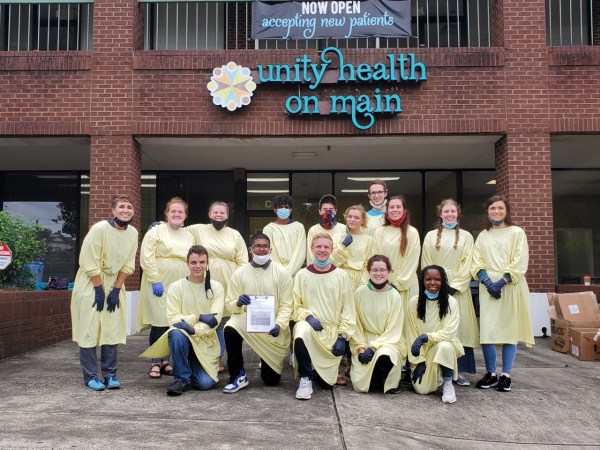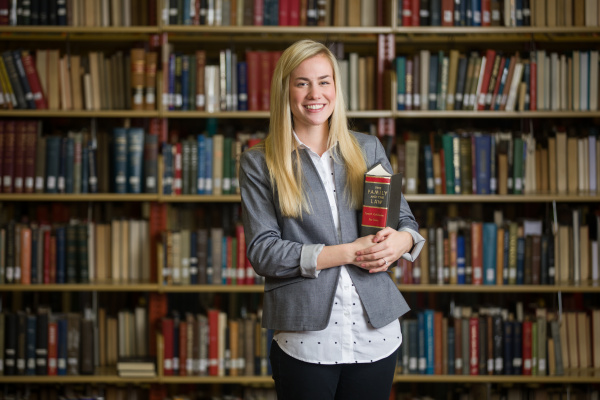One of BJU’s points of pride is that a sizable percentage of students are hired before graduation. One academic program that highlights this well is accounting.
Faculty has structured it to provide meaningful opportunities for students to interact with potential employers through recruiting events and internships.
Accounting Reception
The Division of Accounting has held an annual Accounting Reception for the past two decades to connect juniors and seniors with potential employers. While adjustments had to be made to comply with COVID-19 protocols, the 2020 event was yet a success.
Innovation
The School of Business faculty and students reshaped the traditional reception into a virtual event.
“This idea was brand new to everyone, but with a lot of teamwork it worked out really well,” said Jeff Bryson, one of the key accounting faculty members involved in the reception.
While no recruiters were able to physically be on campus, over 20 companies, firms and graduate schools were able to hold one-on-one conversations with 98% of the accounting juniors and seniors currently without internships or job offers. “We had 51 recruiter personnel and 39 students participate. By the end of the evening they had conducted 246 chats among themselves,” said Bryson.
Teamwork
Several departments came together as a team to ensure this success. Career Services prepared students in advance for the interviews, trained students and faculty on software that would facilitate interviews, and provided a tech support team on the day of the event.
Bryson explained that the software used “allowed students to upload a picture along with their resume and then sign up with … employer companies who wanted to speak with them. The software created a queue where students could wait ‘in line’ to talk to each recruiter. … We are grateful to all the accounting firms who used Zoom, Teams and FaceTime along with their own software. Many of the recruiters were graduates of BJU who are offering a helping hand to this year’s class.”
“The best I can tell, this is the 21st year we’ve held the event,” said Dr. Kris Martin of the School of Business faculty, “and it is one of the cornerstones of our entire recruiting process (along with the internship program, Career Services’ ongoing support, and active involvement of graduates).”
Internships
As Martin said, another cornerstone of the accounting program is the internship program. Interning with a company allows students to apply theories they have been learning in the classroom to real-life scenarios. Seniors Grant McLravy and Mark Lehner interned with NLP CPAs in Virginia Beach, Virginia, this summer, and both said they benefited from the hands-on experience.
Gary Whitelam, one of their mentors at the firm, said that during the internship “Mark and Grant were encouraged to speak to clients, ask questions to understand the business, how it operates, its niche, etc. As they began to understand the business, they started seeing how allocation of the numbers affected the way they completed their work and therefore the financials.”
Real People, Real Consequences
Lehner said he felt prepared for the context in which he would be working, “but I wasn’t used to having a real client name to attach it to, a real person. When you do a problem in a book, there are no ramifications afterwards.” Having a living person to interact with made it real to him that “when you’re dealing with an actual person who just isn’t stagnant, they’ll react one way or another way. Different clients will react differently if you do this and if you do that. So, you have a little bit of strategy to what you’re doing.”
Homework vs. Real Life
McLravy found that simply knowing how to find the correct answer wouldn’t cut it in real life. “On a homework problem, if you can get the right answer, you’re good. Whereas in accounting, you have to have every single step laid out — Here’s what I did; here’s how I got to it,” he said. “It felt kind of like going back to high school math where they always make you show your work again. It was something that … made me realize that doing homework is very different than having a real job.”
For McLravy, interacting with living humans also made the work come alive. “It’s way more exciting to meet someone and help them rather than to look at words on a page and get a point for it,” he said.
An Offer for the Future
Though Lehner and McLravy’s internship has ended, the two plan to return to NLP CPAs. No contracts have been signed, but both were offered verbal offers for employment after graduation in May 2021.
“The top two criteria for candidates we look for are: a teachable spirit and willingness to make a commitment,” said Whitelam. “Our firm’s management spends an enormous amount of time training employees (often one-on-one). As such, we need people who not only want to learn but have a hunger to do so— ie. have a teachable spirit. Both Mark and Grant have teachable spirits.
“Due to the enormous time investment we make in our employees, they need to stay a minimum of 3–5 years. Of course, we never know where the Lord may lead. As such, we have entered into verbal agreements to allow Mark and Grant to pray and seek counsel about this decision as to whether this is where they believe the Lord wants them for next 3–5 years.”
“Mark and Grant are typical accounting interns,” said Martin. “They got valuable on-the-job experience, they got a stronger idea of career opportunities, and in their case, they got a full-time job offer (for after graduation) as they finished their internship.”
Said Bryson, “Mark and Grant are examples of students who showed great initiative in doing an internship this summer after it looked like all was lost due to (COVID-19). Their employer was good to them in terms of training and experience. Best of all that firm is going to hire them for a full-time job after they graduate in May 2021. They will grow from it by now focusing on passing the CPA Exam as soon as they can after graduation.”
Advice to Classmates
McLravy and Lehner’s internship taught them many lessons, some they wish they knew as freshmen. McLravy encourages the classmates coming behind him to build relationships. “The only reason I got this internship was because I knew Mark and Mark knew me. So actually developing solid relationships with the people in your class is crazy important, and that’s something I didn’t prioritize freshman year, and I think I should have done that more is make better relationships with the people not only in my major but with the University at large because networking is seriously huge.”
Lehner was “very humbled by looking back at the work I had done in school and how much of it I had done just to pass.” As a result, his advice to underclassmen is to concentrate on learning the material and not on getting the grades.
“It might take you half an hour to get the A on the assignment but take an extra 15–20 minutes to just digest and think through how to apply it. I learned to not just do work to pass it because in the end, you’re not going to be tested on your grade point, you’re going to be tested on what you can actually do. It’s obvious, but that’s what internships really show you.”








